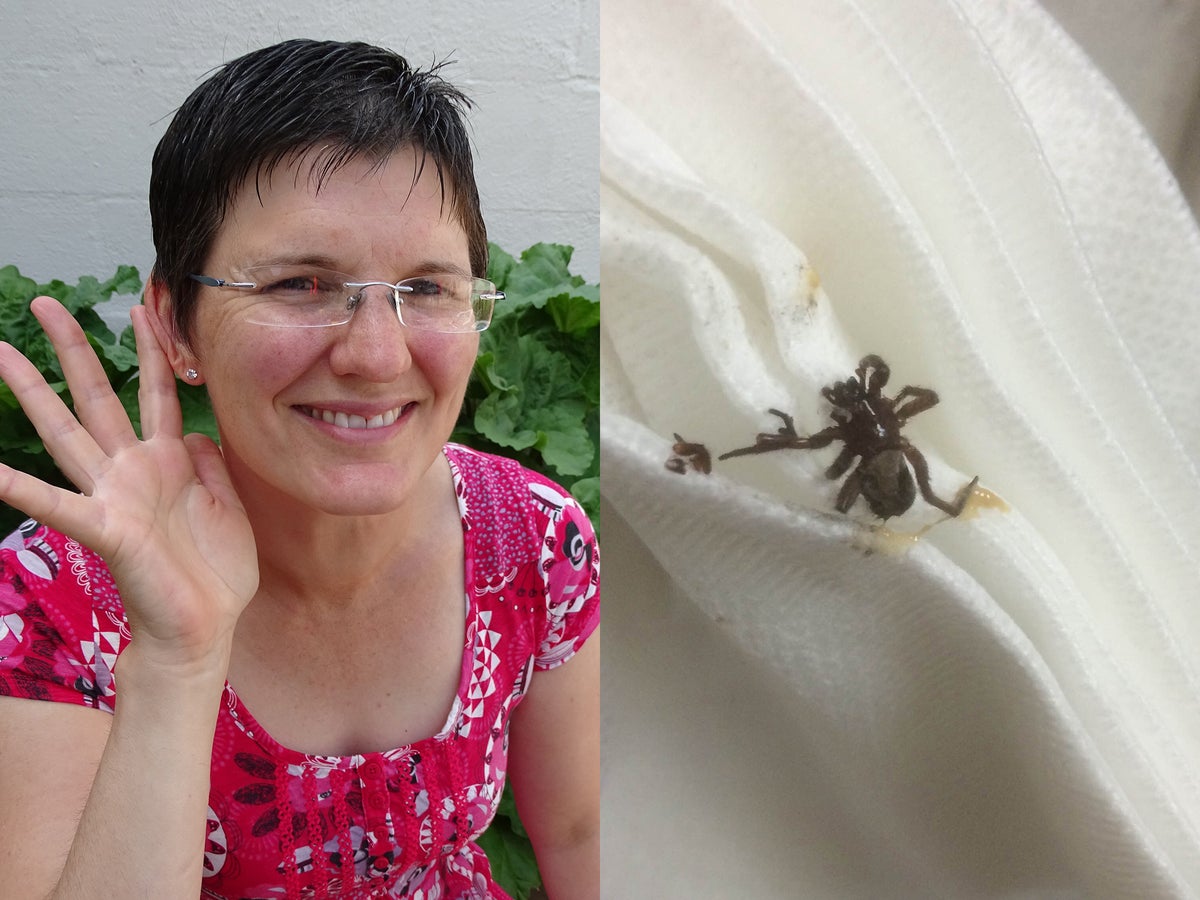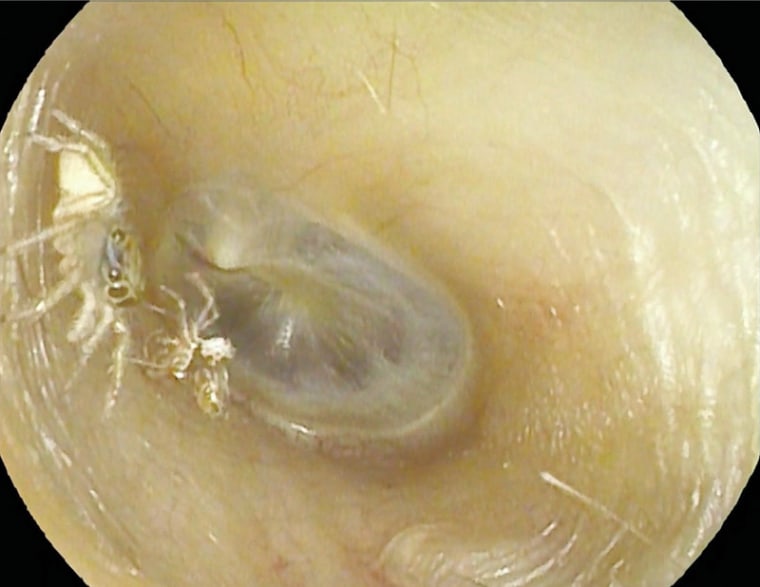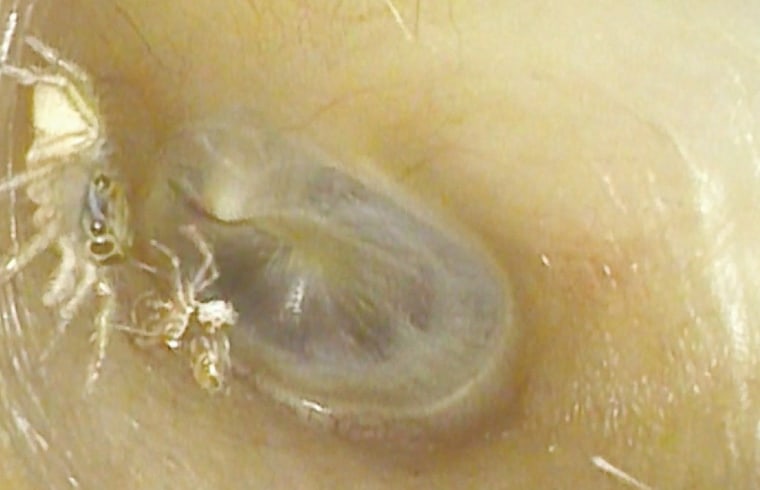If a spider goes in your ear, remain calm and seek medical help immediately. It’s important to avoid trying to remove it yourself.
Having a foreign object in your ear can cause injury or infection. In this blog post, we will discuss what to do if a spider goes in your ear and provide tips on how to prevent such incidents. We will also explore the potential risks associated with foreign objects in the ear and highlight the importance of seeking professional medical assistance.
Stay informed and prepared in case of emergencies involving your ears to ensure your safety and well-being.

Credit: www.ndtv.com
Introduction To Ear Invaders
Discover what to do if a spider gets into your ear with Ear Invaders. Learn how to handle this unsettling situation and find out the best course of action to ensure your safety and well-being.
Have you ever felt a crawling sensation inside your ear? It’s a scary feeling, right? The thought of a bug, especially a spider, getting inside your ear can cause panic and distress. The ear canal is a warm and dark place, making it an ideal spot for small creatures to crawl in and take up residence. These unwanted invaders can cause discomfort, pain, and even lead to infections. In this post, we’ll discuss what to do if a spider goes in your ear and introduce you to the common types of bugs found in ears.Common Types Of Bugs Found In Ears
The ear is a sensitive part of the body, and it’s not uncommon for bugs to get trapped inside. The most common types of bugs found in ears are:| Bug | Description |
|---|---|
| Ants | Small, black or red insects that can crawl into ears while sleeping or lying on the ground. |
| Moths | Small, flying insects that can accidentally fly into ears. |
| Cockroaches | Hardy insects that can crawl into the ear canal while searching for food and shelter. |
Initial Reactions And Precautions
If you feel something crawling or fluttering in your ear, resist the urge to panic. First, try to remain calm and avoid moving your head or shaking it vigorously. Moving your head can cause the bug to burrow deeper into your ear canal, making it difficult to remove. Instead, tilt your head to the side with the affected ear facing downwards and gently shake it. This may help dislodge the bug.Do not try to remove the bug using cotton swabs, tweezers, or other tools. This can cause injury to your ear canal or push the bug further inside. Instead, seek medical attention immediately. A doctor can safely remove the bug using specialized tools and examine your ear for any damage or infection.In conclusion, bugs in the ear can be a distressing experience, but it’s important to stay calm and seek medical attention. Remember to take precautions, such as wearing earplugs while sleeping or working in outdoor environments. By being aware of the common types of bugs that can invade your ear and knowing how to react, you can protect yourself from unnecessary discomfort and potential harm.
Credit: www.independent.co.uk
Initial Steps After Discovering A Spider In Ear
Initial Steps After Discovering a Spider in Ear
Stay Calm And Assess The Situation
Remain calm and assess the situation when discovering a spider in your ear. Panicking can exacerbate the issue, so take deep breaths and try to stay composed. Assess the severity of the situation and determine the next steps.
Avoid Using Fingers Or Tweezers
Avoid using fingers or tweezers to remove the spider from the ear. Inserting objects into the ear can push the spider further inside or cause injury. It’s crucial to refrain from attempting to remove the spider yourself and seek professional medical assistance.
Home Remedies To Remove The Spider
If a spider finds its way into your ear, there are a few home remedies you can try to remove it safely. Gently tilting your head to the affected side, using gravity, may encourage the spider to crawl out. It is important to remain calm and seek medical attention if the spider does not come out or if there are any complications.
Tilting The Head To Encourage Exit
One of the first things you can try if you have a spider in your ear is to tilt your head in order to encourage the spider to exit. By tilting your head to the affected side, you can create a slight slope that may help the spider find its way out more easily. This method can be effective in cases where the spider is still alive and actively trying to escape.
Using Gravity To Your Advantage
Another home remedy that can be used to remove a spider from your ear is to use the force of gravity. Lie down on your side with the affected ear facing downwards. This position can make it easier for the spider to crawl out of your ear naturally due to gravity. It is important to stay calm and avoid any sudden movements that could frighten the spider further into your ear.
Medical Solutions For Ear Blockages
If a spider goes in your ear, it can be a frightening experience. However, there are medical solutions available to address ear blockages caused by foreign objects. Seek immediate professional help to safely remove the spider and alleviate any discomfort or potential complications.
Medical Solutions for Ear BlockagesIf you ever find yourself dealing with a spider in your ear, it is important to know the appropriate medical solutions for ear blockages. While it can be a distressing situation, there are steps you can take to address the issue. This blog post will guide you through the different options, including over-the-counter treatments and when it is necessary to seek professional help.Over-the-counter Treatments
When faced with an ear blockage caused by a spider or any other foreign object, you may consider trying over-the-counter treatments first. These options can help alleviate the discomfort and potentially resolve the issue on your own. Here are some common over-the-counter treatments you can explore:1. Eardrops: Certain eardrops available at pharmacies can help soften the earwax or debris, making it easier to remove. Look for eardrops specifically designed for ear blockages, and follow the instructions carefully.2. Warm olive oil: Applying a few drops of warm olive oil into the affected ear can help soften the blockage. Tilt your head to the side and let the oil sit for a few minutes before draining it out. This method can be effective in dislodging foreign objects.3. Hydrogen peroxide: Diluted hydrogen peroxide can be used to flush out the ear and remove blockages. Ensure you use a solution specifically meant for ear cleaning and follow the instructions provided.When To Seek Professional Help
While over-the-counter treatments can often resolve minor ear blockages, there are situations where it is crucial to seek professional help. If the blockage persists or if you experience any of the following symptoms, it is important to consult a healthcare professional:1. Severe pain: If you are experiencing intense pain in your ear, it may indicate a more serious issue. Seeking medical attention can help identify the underlying cause and provide appropriate treatment.2. Bleeding or discharge: If you notice bleeding or unusual discharge from your ear, it is important to consult a professional immediately. This could be a sign of infection or injury that requires medical intervention.3. Hearing loss: If the blockage is causing a noticeable decrease in your hearing ability, it is advisable to seek medical help. A healthcare professional can determine the cause of the hearing loss and recommend the appropriate course of action.Remember, your ears are delicate organs, and it is essential to handle any blockages with care. While over-the-counter treatments can offer temporary relief, seeking professional help is crucial if the symptoms worsen or persist. By taking the appropriate steps, you can ensure the safety and well-being of your ears.The Role Of Olive Oil And Warm Water
When a spider finds its way into your ear, it can be a terrifying and discomforting experience. In such situations, the role of olive oil and warm water can be crucial in safely removing the spider from your ear.
How To Use Olive Oil
1. Tilt your head so that the affected ear is facing upwards.
2. Gently pour olive oil into the ear canal using a dropper.
3. Remain in this position for 5-10 minutes to allow the oil to suffocate and dislodge the spider.
Using Warm Water Flush
If the spider is still present after using olive oil, the next step is to perform a warm water flush.
1. Fill a bulb syringe with lukewarm water.
2. Tilt your head and gently squirt the water into the ear to flush out the spider.
3. Repeat the process until the spider is expelled from the ear canal.
Preventive Measures To Avoid Future Incidents
If a spider goes into your ear, do not panic. Stay calm and avoid trying to remove it yourself. Seek immediate medical attention to prevent further complications. It’s crucial to follow these preventive measures to avoid future incidents and ensure your safety.
Maintaining Cleanliness
Regularly clean ears with a damp cloth to remove dirt and debris.
Keep ears dry to prevent moisture buildup that attracts insects.
Using Ear Protection
Wear earplugs when in dusty or insect-prone areas.
Avoid inserting objects into ears to prevent accidental entry.
Understanding The Risks Of Ear Blockages
Ear blockages can be a risk to our hearing and overall health. If a spider goes in your ear, it’s important to seek medical attention immediately to prevent further damage or infection.
Potential Complications
If a spider gets into your ear, it can lead to various complications. One potential risk is ear blockages, which may cause pain and hearing loss.An ear blockage can also result in infections if not promptly addressed. Seeking medical attention is crucial to prevent further issues.Long-term Effects Of Neglect
Neglecting an ear blockage can lead to long-term consequences. This may include permanent hearing loss and damage to the ear canal.Ignoring the issue can also result in chronic infections and complications that may require extensive treatment.Remember, early intervention is key to preventing these long-term effects.
Credit: www.today.com
Professional Removal Of Foreign Objects
If a spider enters your ear, seek professional removal of foreign objects immediately. Avoid using cotton swabs or tweezers, as these can push the spider further in. Stay calm and seek medical assistance to safely and effectively address the situation.
What To Expect At The Doctor’s Office
At the doctor’s office, the spider in the ear will be professionally removed using specialized tools. The doctor will perform a thorough examination to ensure complete extraction.Post-removal Care And Observation
After the spider is removed, the doctor will provide care instructions for the ear. It’s important to monitor for any signs of infection or discomfort.Conclusion: Ensuring Ear Health
If a spider goes in the ear, it’s important to remain calm and seek medical attention. Trying to remove it at home can cause further damage to the ear canal. Prevention is key, so be sure to wear earplugs in situations where insects may be present.
Summarizing Safe Practices
Always seek medical help if a spider enters your ear.
Do not try to remove it yourself to prevent injury.
Encouraging Awareness And Education
Learning about ear health can prevent such incidents.
Teach children to avoid putting objects in their ears.
Frequently Asked Questions
What Should I Do If A Spider Goes Into My Ear?
If a spider enters your ear, stay calm and visit a doctor immediately.
Can A Spider In The Ear Cause Damage?
Yes, a spider in the ear can cause discomfort and potential harm.
How Can I Prevent Spiders From Entering My Ear?
To prevent spiders from entering your ear, use insect repellent and maintain ear hygiene.
Conclusion
Having a spider crawl into your ear can be a terrifying experience. However, it is important to remain calm and seek medical attention immediately. Avoid using any foreign objects to remove the spider as this can cause further damage. Prevention is key, so take measures to keep spiders out of your home.
Remember, your safety should always be a top priority.
Related posts:

I’m MD Tanvir, and I bring years of expertise gained from working closely with pest control companies to the forefront. My journey in the industry has inspired me to launch Bug Battler, a platform aimed at equipping people with the know-how to combat pests autonomously. Through Bug Battler, I aim to empower individuals with practical insights to tackle pest infestations effectively.

